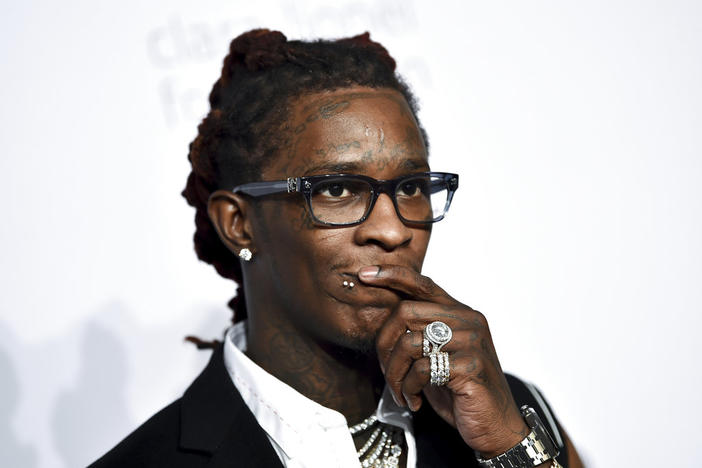Section Branding
Header Content
Millions of disabled Americans could lose federal benefits if they get married
Primary Content
When Americans with disabilities get married they risk losing federal benefits. Momentum is building on Capitol Hill to change the rules.
Transcript
KELSEY SNELL, HOST:
For millions of Americans with disabilities, tying the knot can mean losing federal benefits they rely on. Erika Mahoney of member station KAZU in Monterey, Calif., has the story of one couple caught in a loophole.
ERIKA MAHONEY, BYLINE: Five years ago, Lori Long's boyfriend, Mark Contreras, got down on one knee. The moment captured on video.
(SOUNDBITE OF ARCHIVED RECORDING)
LORI LONG: Yes, I'll marry you. Yes, I'll marry you. Yes. Yes.
MAHONEY: Long dreamed about finding love but wasn't sure it would happen.
LONG: Especially for somebody like myself with a significant disability and a spinal deformity, like I have.
MAHONEY: Long has an autoimmune disorder that results in painful fractures in her spine. After the proposal, she started looking at wedding dresses.
LONG: Thinking about possible venues, looking at invitations.
MAHONEY: Then the nightmare hit. She learned marrying her fiance, who isn't disabled, would mean completely losing her federal disability benefits and Medicare. Long and Contreras went from happiness to...
LONG: Heartbreak.
MARK CONTRERAS: Definitely disappointment, but I didn't want to lose or give up on her.
MAHONEY: Long gets her health care through a Social Security program. Its complicated rules, written decades ago, assume the spouse can cover medical expenses. Long works part time in retail. Contreras works for a nonprofit, but his insurance wouldn't cover everything Long needs. Her health care isn't just a few trips to the doctor every year but hospital stays upwards of 50 grand per visit. Together, they decided it was a love story worth the fight.
JIMMY PANETTA: She inspires me, and she inspired me to write this bill.
MAHONEY: That's Congressman Jimmy Panetta of California. Last month, he introduced the Marriage Equality for Disabled Adults Act in the U.S. House of Representatives. It would ensure that people like Long never have to choose between health care or marriage.
PANETTA: We just feel that's an antiquated and borderline cruel law that should be changed.
MAHONEY: Millions of Americans with disabilities face marriage penalties, a total or partial loss of their federal benefits. There's a separate bill in the Senate to end the penalty for people on another federal disability program. Senator Sherrod Brown of Ohio introduced that legislation.
SHERROD BROWN: It makes no sense from a logic viewpoint. It makes no sense from a moral viewpoint. It makes no sense from a religious viewpoint.
LONG: It makes no sense in today's world, says disability rights advocate Bethany Lilly.
BETHANY LILLY: I don't think, you know, 50 years ago, people would be thinking about people with disabilities getting married, whereas now that's just a perfectly normal expected part of life for a lot of people.
MAHONEY: Lilly is with The Arc, a national disability organization based in Washington, D.C. She hears heartbreaking stories all the time.
LILLY: Generally speaking, I suggest that people talk to a lawyer before they think about getting married. That's an unfortunate position to put folks with disabilities into.
MAHONEY: And, says Lilly, the wrong message to send.
LILLY: As a person with a disability and as somebody who identifies as LGBTQ, for me, marriage means the acceptance by society.
MAHONEY: For Lori Long, this Valentine's Day is a painful reminder that her wedding has been on hold for five years.
LONG: Love is very powerful, and I think when two people are able to tap into that energy, then look out world because that kind of loving energy is close to unstoppable.
MAHONEY: She and her fiance aren't giving up on saying, I do.
For NPR News, I'm Erika Mahoney in Monterey.
(SOUNDBITE OF MUSIC) Transcript provided by NPR, Copyright NPR.
Bottom Content


